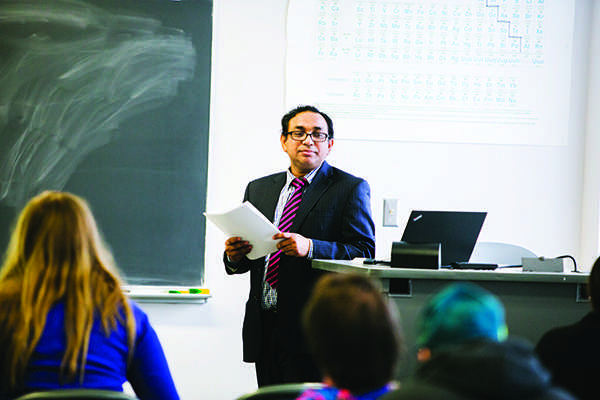“Islam says that the purification of the soul is the greatest fight. A place in the Quran says whether you are black or white, rich or poor, that doesn’t count to Allah.”
The travel ban executive order instituted by President Donald Trump was temporarily suspended earlier this month but fears still linger with people from many countries, even those not included in the ban, philosophy professor Azam Golam said.
Because the seven countries included in the ban are primarily Muslim, rhetoric surrounding the ban can incite many misconceptions of the religion. Most of these misconceptions stem from lack of education or ignorance toward people from unfamiliar places, Azam said.
“I do not know what would be the reaction of the people if they knew I am Muslim or from a Muslim-driven country. There is a possibility that people could react in different ways,” he said.
Azam is from Bangladesh, a country that is not included on the list of banned countries, but has an 86 percent Muslim population. He joined the faculty at Northern in the fall of 2016. Previously, he taught at the University of Dhaka in Bangladesh and the State University of Bangladesh.
Azam explained that he came to the United States because there was greater opportunity to get a job in liberal arts. With the recent election and travel ban executive order, he said there are fears from people who are from primarily Muslim countries either living or looking to travel to the states.
“I am afraid that all of these presidential orders will leave us polarized and isolated. I am afraid that—because of these rulings—some people may not want to hire me. It is a trauma,” he said.
Azam’s research is focused on social and political philosophy as well as issues in applied ethics. He also studies epistemology, a branch of philosophy that investigates the origin, nature, methods and limits of human knowledge.
Azam explained that these orders go against the view many people have of western countries.
“Why do people like western countries? Why is that? It is because of the philosophy of the political society, because of the philosophy of liberty and freedom,” he said. “When we talk about humility, we talk about how people are free, how people are equal, we talk about respect.”
Most people in the seven countries included in the travel ban are liberal, he said. Radical and terrorist groups go against many of the teachings of the Quran through their acts of violence and oppression. That is why there are so many refugees fleeing from their homes.
“If you kill or you hurt someone, you are hurting the whole of humanity,” Azam said.
Much of the ban has left people confused, he explained. The people looking to travel to the United States are searching for liberty.
“A permanent fear, irreparable trauma, people are psychologically disheartened,” Azam said. “What does it mean, this temporary ban? It means that we are pushing the liberal people to the radical people, right? Intentionally. You’re pushing these people to the radicals.”
Azam said that the orders and rhetoric behind many of Trump’s statements could affect more people than expected.
“I am worried about the liberal pillars of the country because if people lose their freedom of religion, lose their freedom of speech and the judiciary can’t work properly, that would be alarming not only for the minorities but also for the majorities,” he said.
The best way to fight ignorance is to expose yourself to someone else’s culture, Azam said. He encourages students to attend the Muslim Awareness Forum at 3 p.m. in the Marquette Room in the University Center Friday March 3.
The forum will tackle misconceptions about Muslim beliefs, practices and lifestyle and compare them to Christianity and other religions. Speakers will include head of political science Carter Wilson and head of history department Keith Kendall.


























Tareq • Feb 24, 2017 at 1:57 pm
Very well said. Agree with him.